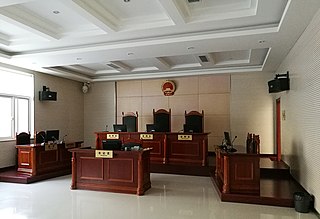Related Research Articles

Chinese philosophy originates in the Spring and Autumn period and Warring States period, during a period known as the "Hundred Schools of Thought", which was characterized by significant intellectual and cultural developments. Although much of Chinese philosophy begun in the Warring States period, elements of Chinese philosophy have existed for several thousand years. Some can be found in the I Ching, an ancient compendium of divination, which dates back to at least 672 BCE.

Jurisprudence is the philosophy and theory of law. It is concerned primarily with both what the law is and what it ought to be. That includes questions of how persons and social relations are understood in legal terms, and of the values in and of law. Work that is counted as jurisprudence is mostly philosophical, but it includes work that also belongs to other disciplines, such as sociology, history, politics and economics.

Chinese law is one of the oldest legal traditions in the world. The core of modern Chinese law is based on Germanic-style civil law, socialist law, and traditional Chinese approaches.

International relations (IR) are the interactions among sovereign states. The scientific study of those interactions is also referred to as international studies, international politics, or international affairs. In a broader sense, the study of IR, in addition to multilateral relations, concerns all activities among states—such as war, diplomacy, trade, and foreign policy—as well as relations with and among other international actors, such as intergovernmental organizations (IGOs), international nongovernmental organizations (INGOs), international legal bodies, and multinational corporations (MNCs). There are several schools of thought within IR, of which the most prominent are realism, liberalism and constructivism.
International relations theory is the study of international relations (IR) from a theoretical perspective. It seeks to explain behaviors and outcomes in international politics. The four most prominent schools of thought are realism, liberalism, constructivism, and rational choice. Whereas realism and liberalism make broad and specific predictions about international relations, constructivism and rational choice are methodological approaches that focus on certain types of social explanation for phenomena.
Legal positivism is a school of thought of philosophy of law and jurisprudence which holds that law is constructed from social facts, without regards to the merits of such law. It was developed largely by legal philosophers during the 18th and 19th centuries, such as Jeremy Bentham and John Austin. While Bentham and Austin developed legal positivist theory, empiricism provided the theoretical basis for such developments to occur. Some of the most prominent legal positivist writers of the 20th century have been Hans Kelsen, H. L. A. Hart, and Joseph Raz.

New Confucianism is an intellectual movement of Confucianism that began in the early 20th century in Republican China, and further developed in post-Mao era contemporary China. It primarily developed during the May Fourth Movement. It is deeply influenced by, but not identical with, the neo-Confucianism of the Song and Ming dynasties.

Hans Joachim Morgenthau was a German-American jurist and political scientist who was one of the major 20th-century figures in the study of international relations. Morgenthau's works belong to the tradition of realism in international relations theory; he is usually considered among the most influential realists of the post-World War II period. Morgenthau made landmark contributions to international relations theory and the study of international law. His Politics Among Nations, first published in 1948, went through five editions during his lifetime and was widely adopted as a textbook in U.S. universities. While Morgenthau emphasized the centrality of power and "the national interest," the subtitle of Politics Among Nations—"the struggle for power and peace"—indicates his concern not only with the struggle for power but also with the ways in which it is limited by ethical and legal norms.
Tianxia, literally 'under Heaven', is a Chinese term for a historical Chinese cultural concept that denoted either the entire geographical world or the metaphysical realm of mortals, and later became associated with political sovereignty. In ancient China and imperial China, tianxia denoted the lands, space, and area divinely appointed to the Chinese sovereign by universal and well-defined principles of order. The center of this land was directly apportioned to the Chinese court, forming the center of a world view that centered on the Chinese court and went concentrically outward to major and minor officials and then the common subjects, tributary states, and finally ending with fringe barbarians.

Realism, a school of thought in international relations theory, is a theoretical framework that views world politics as an enduring competition among self-interested states vying for power and positioning within an anarchic global system devoid of a centralized authority. It centers on states as rational primary actors navigating a system shaped by power politics, national interest, and a pursuit of security and self-preservation.
Philosophy is the study of general and fundamental problems concerning matters such as existence, knowledge, values, reason, mind, and language. It is distinguished from other ways of addressing fundamental questions by being critical and generally systematic and by its reliance on rational argument. It involves logical analysis of language and clarification of the meaning of words and concepts.
The following outline is provided as an overview of and topical guide to ethics.

Yan Xuetong is a Chinese political scientist and serves as a distinguished professor and dean of the Institute of International Relations at Tsinghua University. Yan is one of the major Chinese figures in the study of international relations (IR). He is the founder of 'moral realism', a neoclassical realist theoretical paradigm in IR theory. His moral realist theory is based on political determinism.
Zhao Tingyang is a political philosopher credited with modernising the ancient Chinese concept of Tianxia. He argues that the concept of a new Tianxia or all-under-heaven can offer an alternative blueprint for creating a more peaceful and inclusive world.
Ethics is the branch of philosophy that examines right and wrong moral behavior, moral concepts and moral language. Ethics or moral philosophy is a branch of philosophy that "involves systematizing, defending, and recommending concepts of right and wrong behavior". The field of ethics, along with aesthetics, concerns matters of value, and thus comprises the branch of philosophy called axiology.
Agential realism is a theory proposed by Karen Barad, in which the universe comprises phenomena which are "the ontological inseparability of intra-acting agencies". Intra-action, a neologism introduced by Barad, signals an important challenge to individualist metaphysics.
American Tianxia is a term coined by the historian Wang Gungwu in 2013 to refer to the contemporary global order centered on the United States. It was further developed by sociologist Salvatore Babones to analyze today's millennial world-system through the lens of the Chinese concept of tianxia, meaning "all under heaven." While the United States is often called an "empire," this is a historically loaded term that is associated with perceptions of American imperialism. The concept of tianxia has a different set of meanings attached to it that Wang suggests and Babones argues are closer to what the United States actually displays in its contemporary approach to foreign affairs.

Xi Jinping Thought on Diplomacy, officially the "General Secretary Xi Jinping's Thought on Diplomacy", is the current diplomatic and foreign policy doctrine of the People's Republic of China. It is related to the larger Xi Jinping Thought, which is derived from the General Secretary of the Chinese Communist Party Xi Jinping. According to Chinese foreign minister Wang Yi, Xi Jinping Thought on Diplomacy is "the fundamental guideline for China's diplomatic work is an epoch-making milestone in the diplomatic theory of New China." The main point of Xi Jinping Thought on Diplomacy is to orient as much of diplomacy as possible to the bilateral level, while still supporting the formal architecture of the international system. In terms of China's foreign policy, Xi Jinping's "Major Country Diplomacy" doctrine has replaced the earlier Deng Xiaoping era slogan of "keep a low profile and build up power" and has legitimized a more active role for China on the world stage, particularly with regards to reform of the international order, engaging in open ideological competition with the West, and assuming a greater responsibility for global affairs in accordance with China's rising power and status.
Global Security Initiative is an initiative proposed by Chinese Communist Party general secretary Xi Jinping during the annual Boao Forum on 21 April 2022. Officially, the initiative is meant to "uphold the principle of indivisible security, build a balanced, effective and sustainable security architecture, and oppose the building of national security on the basis of insecurity in other countries."
References
- 1 2 Ren, Xiao (2020-07-03). "Grown from within: Building a Chinese School of International Relations". The Pacific Review . 33 (3–4): 386–412. doi:10.1080/09512748.2020.1728573. ISSN 0951-2748.
- 1 2 3 4 5 6 7 8 Curtis, Simon; Klaus, Ian (2024). The Belt and Road City: Geopolitics, Urbanization, and China's Search for a New International Order. New Haven and London: Yale University Press. doi:10.2307/jj.11589102. ISBN 9780300266900. JSTOR jj.11589102.
- ↑ Qin, Yaqing (2016-04-26). "Recent Developments toward a Chinese School of IR Theory". E-International Relations. Retrieved 2024-05-08.